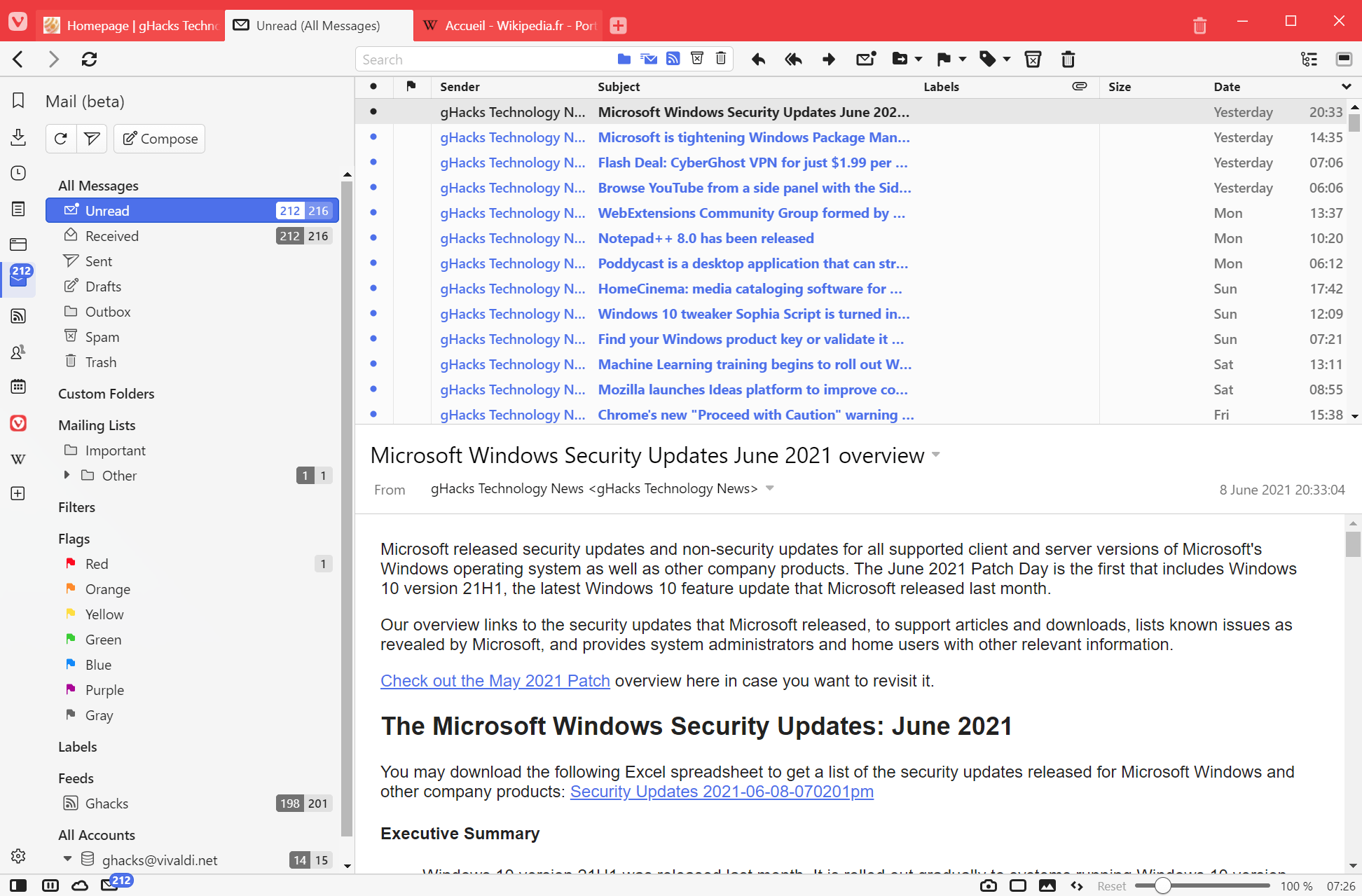Vivaldi Technologies launched Vivaldi Mail 1.0 with calendar and feed reader today in the company’s web browser. Released in late 2020 as a preview, Vivaldi Mail was launched in Vivaldi 4.0 officially.

Vivaldi is one of the few browsers with integrated email client and functionality. The email client includes calendar functionality and a feed reader.
Vivaldi Mail is a free email client that supports multiple email accounts. Many accounts can be added by adding the email address and password to Vivaldi, but there are options to set up IMAP and POP3 email accounts manually as well.
You may manage all accounts in the browser’s interface, and switch between web browsing, emails, calendar and feed reader seamlessly with a click on a button.
Vivaldi users who have not given email or feed reading a try in the browser may enable Mail in Settings > General > Productivity features > Enable Mail, Calendar and Feeds. New users may select the fully loaded option on first start to unlock email.
Vivaldi Mail indexes all emails to make them searchable. You may run searches at any time to find emails of all accounts, even while offline. Offline searching scans headers and if emails are configured to be downloaded from the email server, message content as well. The prefetch option in the email settings will download message content before they are opened. Searches are updated dynamically when new mail arrives.
Live Vivaldi browser, Vivaldi Mail is offering a great range of customization options. The email client supports different views and layouts, including the default three panel layout that displays accounts, messages and the selected message side-by-side, or the classic horizontal layout that splits the mail list and the active message horizontally.
Vivaldi Mail lists all messages in the sidebar by default. There you find default folders, including unread, received and drafts, as well as special folders for mailing lists, filters, flags, labels, and also individual email accounts that you have added to the email client.
Users who like keyboard shortcuts may use them to speed things up. A tap on G jumps to the next unread message, T views the message thread and E views all email from the sender of the selected email.
Vivaldi Mail supports flags and labels to organize emails. Flags add different colors to emails, labels custom tags. Both options support custom views to display emails with specific flags or labels only.
The email client supports additional features, including signatures that can be associated with accounts, a queue feature to send emails at a later time, and themes, to change the client’s paint.
The Calendar complements the email client. Vivaldi supports offline and online calendars. Some users may prefer offline calendars for privacy, others may like the idea of syncing data between all their devices automatically.
Calendar comes with its own view in Vivaldi that lists all upcoming events in a small sidebar on the left side. A click shows and hides it, and there are options to change the time period easily in the panel.
The full calendar supports different views, e.g., by day or week, with events listed by the hour, or a monthly or multi-week view. Vivaldi’s calendar uses a flexible grid so that information is not cut off.
Closing Words
Vivaldi Mail is making a big step with the release of version 1.0. It is integrated directly into the Vivaldi browser for easy access to emails and the integrated calendar and feed reader. Vivaldi Mail supports a number of productivity features that may improve how users work with the client.
All three components, Mail, Calendar and Feed Reader, come with a great range of customization options and features.
Now You: do you prefer Mail baked into a browser, standalone clients, or web-based email?
Thank you for being a Ghacks reader. The post Vivaldi Mail 1.0: email client with calendar and feed reader launches appeared first on gHacks Technology News.
